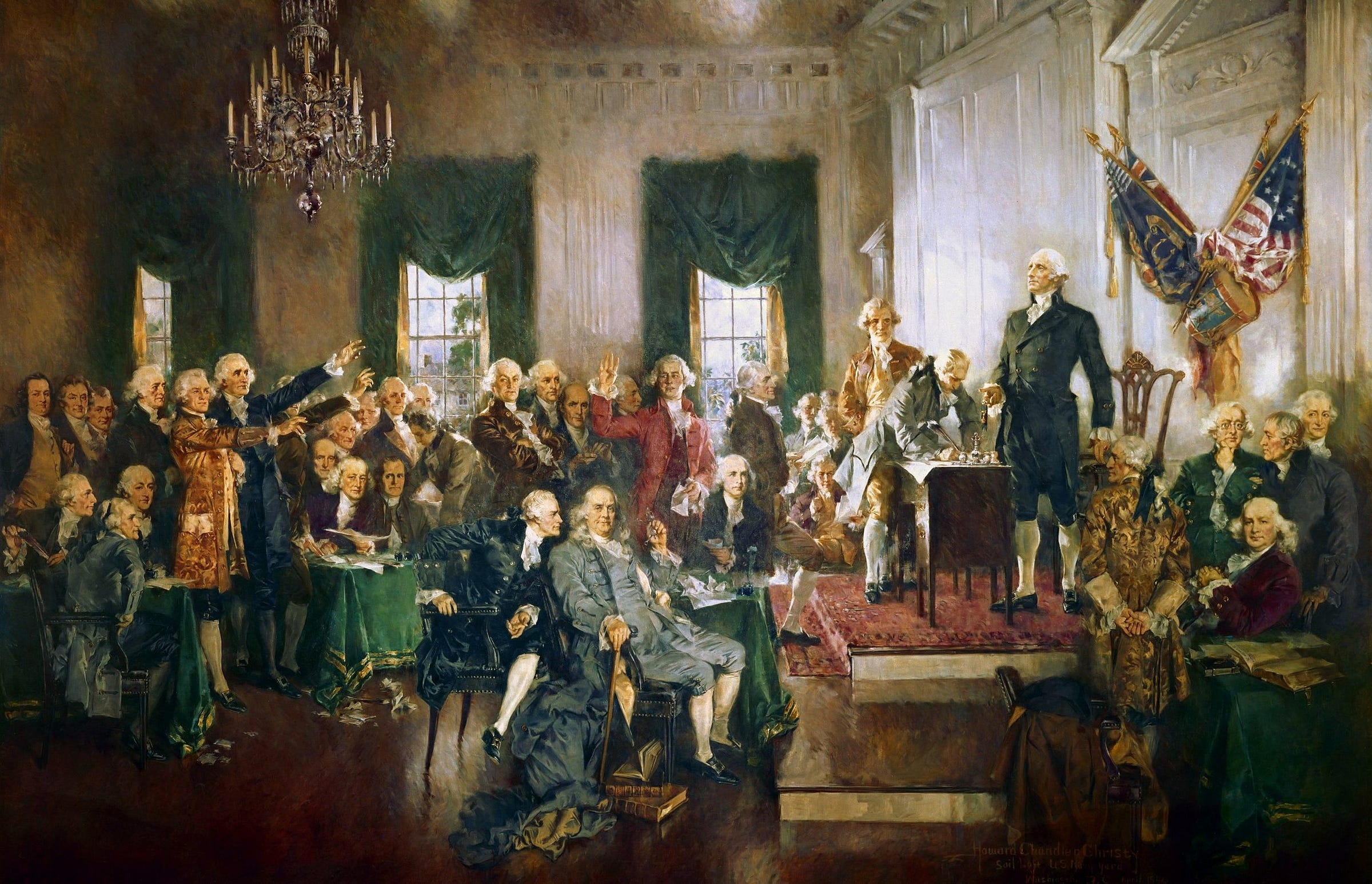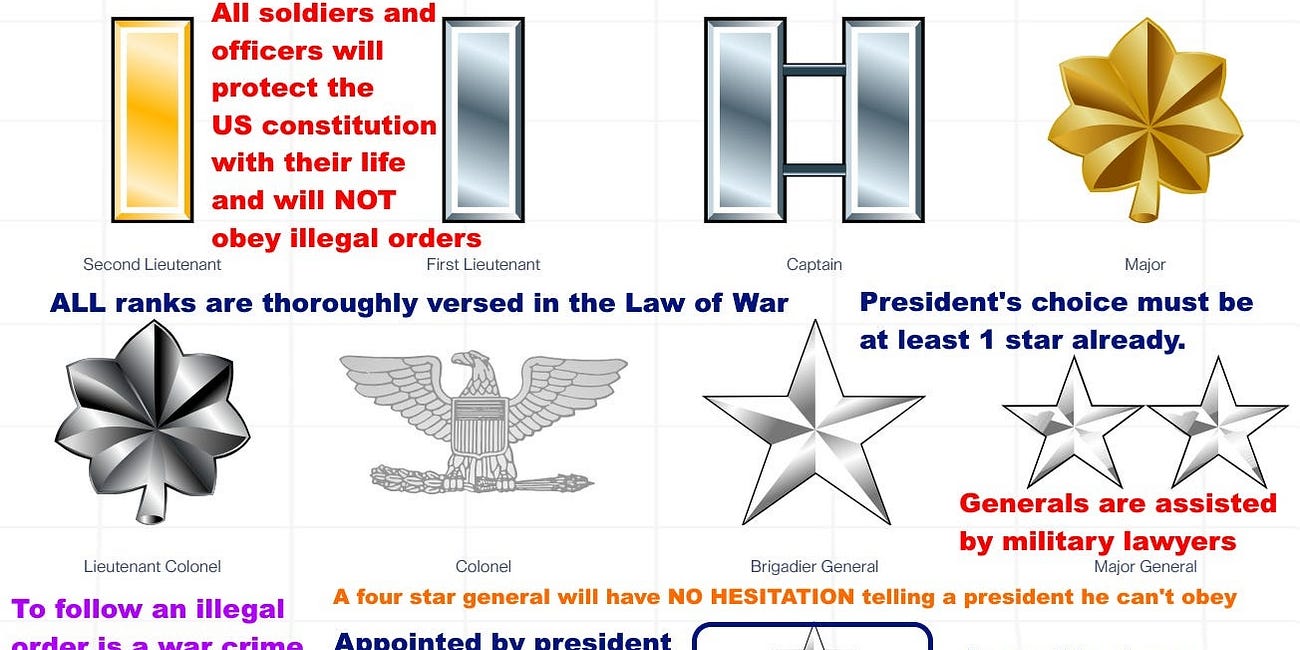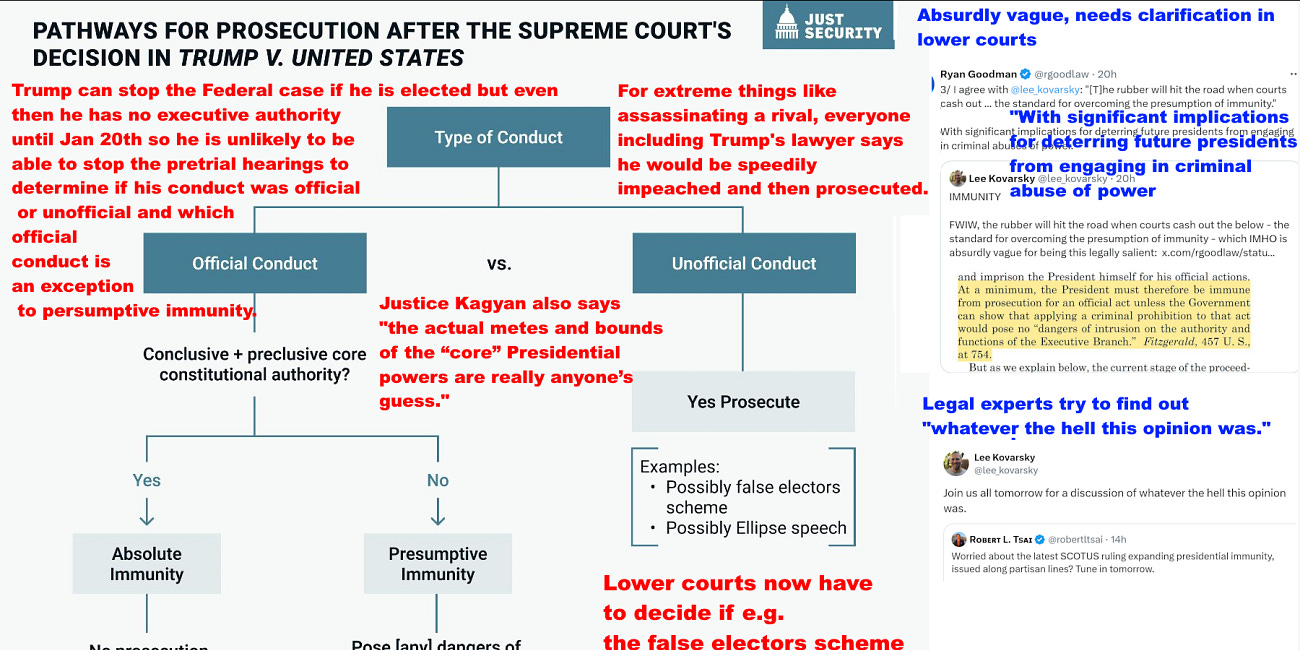Simple maths: a majority in only one chamber in each of 13 states is enough to stop any amendment - 20 states have at least one chamber democrat - and the US Constitution can never be suspended
Also any US constitutional convention of States must be called by 1. a bipartisan coalition of States or 2. a bipartisan decision in Congress
You can click to go to any section of this page - first click on the horizontal lines in the left margin of this page to show the menu.
The courts don't ratify amendments to the constitution. Only legislators do.
For anyone not in the USA: each state has its own mini Congress with a house and senate except Nebraska has only a senate. Those legislators are voted for in the states at the same time as the normal elections. Each state also has a governor which is elected by popular vote and is like the state version of a president.
So then, to amend the constitution the same amendment must be ratified in the same identical text by a majority vote in both chambers of the State legislatures - except for Nebraska where it has only one chamber so needs a majority in that. The governor's decision doesn't matter for amendments.
If it got as far as amendments, the final text needs to be approved in both chambers in at least 38 states. It only takes one chamber in each of 13 states to stop any amendment.
There are 17 states that are Democrat in both chambers and 3 that are mixed. So at least 8 Democrat / mixed states will have to vote for any amendment. See my:
TEXT ON GRAPHIC:
Why any call for a constitution of states must be bipartisan - whether called by states or by congress.
It takes only 17 states and only one chamber in each to stop a constitutional convention called by states.
17 legislatures are Democrat controlled and 3 are divided.
It takes only 34 senators to stop a convention called by Congress.
47 are Democrat.
Democrat controlled:
California
Colorado
Connecticut
Delaware
Illinois
Maine
Maryland
Massachusets
Nevada
New Jersey
New Mexico
New York
Oregon
Rhode Island
Vermont
Virginia
WashingtonDivided:
Minessotta
Michigan
Pennsylvania13 states and only one chamber in each can stop any proposed amendment.
Map from NCS: State Elections 2024
[National College of State Legislatures]
So that’s 20 states that we can expect to stop any partisan Republican inspire only attempt for the States to call a convention of States. Only 17 needed.
The usual way to propose an amendment is by a two-thirds vote of both Houses of Congress. In principle it can also be proposed by a convention of States if two-thirds of the States request one.
An amendment may be proposed by a two-thirds vote of both Houses of Congress, or, if two-thirds of the States request one, by a convention called for that purpose. The amendment must then be ratified by three-fourths of the State legislatures, or three-fourths of conventions called in each State for ratification.
Then the ratificiation is by a simple majority vote in both chambers, in all the staes except Nebraska. It has one chamber called the Senate and it just needs a majority vote in the Senate. Nebraska isn’t listed as either Democrat or Republican as its Senators are unaffiliated.
Step 3. Ratification by three-fourths of the states. Ratification of the amendment language adopted by Congress is an up-or-down vote in each legislative chamber. A state legislature cannot change the language. If it does, its ratification is invalid. A governor’s signature on the ratification bill or resolution is not necessary.
That's 38 states need to ratify it and 13 are enough to stop it.
So, it needs a simple majority vote in both chambers and the governor’s signature is not needed. If the text is changed the ratification is no longer valid.
In Nebraska, the only State without a Senate it only needs a simple majority in the House as that is the only legislative chamber. Nebraska Senators are officialy non partisan so doesn’t count as controlled by either party.
. Nebraska Legislature - Wikipedia
They would also put a limit on how long the ratification process can take.
This would normally be 7 years.
QUOTE Seven-year periods were included in the texts of the proposals of the 18th, 20th, 21st, and 22d amendments; apparently concluding in proposing the 23d that putting the time limit in the text merely cluttered up the amendment, Congress in it and subsequent amendments including the time limits in the authorizing resolution. After the extension debate over the Equal Rights proposal, Congress once again inserted into the text of the amendment the time limit with respect to the proposal of voting representation in Congress for the District of Columbia.
. GPO-CONAN-2002
19 States have asked for the convention so far - all just show as they know they can’t get to the required numbers
First these are the states that have passed the “Convention of states” resolution as of writing this, recoloured their green to magenta for colourblind readers
. Progress Map: States that have passed the Convention of States Article V application
1. Georgia March 6, 2014
2. Alaska April 19, 2014
3. Florida April 21, 2014
4. Alabama May 22, 2015
5. Tennessee February 4, 2016
6. Indiana February 29, 2016
7. Oklahoma April 26, 2016
8. Louisiana May 25, 2016
9. Arizona March 13, 2017
10. North Dakota March 24, 2017
11. Texas May 4, 2017
12. Missouri May 12, 2017
13. Arkansas February 14, 2019
14. Utah March 5, 2019
15. Mississippi March 27, 2019
16. Wisconsin January 25, 2022
17. Nebraska January 28, 2022
18. West Virginia March 4, 2022
19. South Carolina March 29, 2022
Idea of using old still valid Democrat calls for a convention - Democrat states are already rescinding them
This is an idea of using old calls for a convention passed by states for various reasons to try to combine them together with the Republican calls to make it happen. That is a legally unlikely maneuver to succeed but just in case the Democrat controlled states are rescinding their past calls for an open convention for various reasons.
For the background see:
. A Constitutional Convention? Some Democrats Fear It’s Coming.
There's a site here keeps track of the ones outstanding. You can sort it by state by clicking on the state column and look for the ones with a No meaning unlimited convention.
. Interactive State Article V Application Database
Combining that with my list from the graphic, for the ones in it, amongst the 17 Democrat controlled:
Will repeal: California
All repealed: Colorado, Delaware, Maryland, Nevada, New Jersey, New York, Oregon, Virginia (8 states)
All rescinded: New Mexico
All remaining ones limited: Rhode Island.
There are 6 left: of the original 17 that might in principle be used: Connecticut, Illiniois, Maine, Massachusets, Vermont and Washington.
All of those need to rescind their requests to prevent even the minutest chance of such a convention.
Also there are only 23 in the list that have at least one request with "No" under limited. leaving out California again assuming it does rescind.
So they would need to get another 11 calls for a convention, plenty of time for the 6 remaining Democrat ones to rescind.
Plus it is probably not legal anyway because most likely the courts would decide that they all have to be calls for the same type of convention.
E.g. that a call for a convention for a Balanced budget shouldn't be also counted as a call for a convention on Right for Life, say.
So I think they are just being supercautious by rescinding.
In any case, any such convention could rewrite the constitution but then all the changes would need to be ratified.
It would only take 13 states with at least one chamber opposed to prevent ratification. So that will never happen.
So the worst case here is a pointless convention that hits the news with a lot of publicitly that makes a major rewrite that can never be ratified. However it doesn’t seem to be possible so long as the remaining Democrat states rescind in time if more Republican states add new calls for a convention, and it is likely not legal anyway.
Suggestions for future amendments
It is easier to get the support of 34 states for specific amendments, after all many have happened in the past. They can be called for by states first calling for a convention until enough states ask for it for Congress to pay attention. Then Congress typically wil vote for the amendment by a 2/3 majority in both houses.
Here are some suggestions for future amendments by John Kowal and Wilfred Codrington III of the Brennan Center for Justice at NYU Law though these ones seem to be mainly ones that Democrats would favour rather than Republicans:
Eliminate electoral college and replace by popular vote
Equal rights amendment
Reform Supreme Court - 2 supreme court nominations per term and 18 years max
Right to vote built into constitution instead of decided state by state (all states have right to vote laws now but it’s not in the constitution)
Some method for fast congressional succession if some incident leads to much of the congress dying in some catastrophe
. Analysis: 5 constitutional amendments for right now
A second State convention is unlikely -only one ever in 1787 to draw up the constitution
There has only ever been on US state convention, the one in 1787 that drew up the US Constitution.
Extract from Howard Chandler Christy’s, Scene at the Signing of the Constitution of the United States
For details see: United States Constitutional Convention 1787
There have been other calls for a second convention. It’s not just a Republican agenda based idea.
A second constitutional convention could look widely at all these things, both Republican and Democrat priorities. But in practice the numbers aren’t there.
Second Constitutional Convention of the United States - Wikipedia
In reality there probably wouldn't be a convention. If it was getting close to enough states for a convention, Congress would step in and pass the amendment themselves. So that way it wouldn't be a "no-holds-barred Constitution convention"
QUOTE This method has been close to utilization several times. Only one State was lacking when the Senate finally permitted passage of an amendment providing for the direct election of Senators. 23 Two States were lacking in a petition drive for a constitutional limitation on income tax rates. 24 The drive for an amendment to limit the Supreme Court’s legislative apportionment decisions came within one State of the required number, and a proposal for a balanced budget amendment has been but two States short of the requisite number for some time. 25 Arguments existed in each instance against counting all the petitions, but the political realities no doubt are that if there is an authentic national movement underlying a petitioning by two-thirds of the States there will be a response by Congress.
Amendments are sometimes proposed and not ratified - 1979 proposal to make Washington DC into a new state - the path to full statehood would probably be via Congress
There are several amendments that are stuck not ratified eg. the D.C voting rights amendment which would have made Washington D.C. into a new state, passed with 2/3 majority in both houses in 1979 but only 16 states ratified it. It’s now too late to pass that one.
. DC Statehood Explained
The path to full statehood for Washington D.C. if that ever happens will be through a bill instead, the Washington, DC Admission Act which has been passed by the house in 2020 and 2021 but been blocked in the Senate.
Most recent 27th amendment passed in 1992 after over two centuries
There’s a rather amusing story about an undergrad who discovered an uncontroversial 27th amendment that was still on the books and had been ratified by a few states but then had languished for a couple of centuries. He wrote an essay claiming it could still be ratified and got awarded a "C".
The proposed amendment said that a law is passed that increases or decreases the salary of members of Congress it only comes into effect after the next election of the house of Representatives (i.e a delay of at most 2 years).
So - he responded by trying to get the states to ratify this amendment. Sent letters to them all and gradually the momentum built up and it was eventually ratified.
Only four states haven't yet ratified it. Massachusetts, Mississippi, New York, and Pennsylvania.
Says that his grade was retrospectively altered from a C to an A. So - an unusual way to get an A in an undergrad essay :).
. Twenty-seventh Amendment to the United States Constitution - Wikipedia
Anyway - that took 202 years, 7 months, and 10 days to be ratified.
This can’t happen any more because though there are several other unratified amendments, Congress put in place a 7 year rule which wiped the slate of all of those.
Most recently proposed amendment in 1971 to lower voting age to 18 ratified in only 100 days - so uncontroversial bipartisan amendments can be passed relatively quickly
The most recently proposed amendment to be ratified was the 26th amendment which was ratified in 1971. It lowered the voting age to 18 and took only 100 days to ratify.
So an amendment can be ratified quickly if it is very uncontroversial.
Most ratifications have taken around a year, the longest one other than the 27th is the 16th which removed limits on the situations where Congress can levy an income tax, it took 3 years and 206 days to ratify.
So - it would certainly be possible for Congress to propose an uncontroversial amendment and for it to be ratified within one presidential term but it would need broad support and be bipartisan.
Details of amendments proposed here:
. List of amendments to the Constitution of the United States - Wikipedia
Impossible for a president to override civilian courts with martial law and the US constitution can never be suspended
This has been established in a long series of Supreme Court decisions. Your rights can never be taken away from you. For as long as the civilian courts exist cases must be tried in them.
Some rights can be suspended for the duration of an insurrection, mainly your right to see a lawyer, for the duration of the insurrection but as soon as it is over then you must be released and any trials go through the civilian courts.
There is no situation where the US Constitution can be suspended even in a war declared by Congress.
In the US there isn’t even any way to change the term limit, the maximum number of terms a president can serve or the inauguration date without a constitutional amendment.
Civilians must be tried in civilian courts for as long as the courts continue.
— Ex parte Milligan(1866)
Even terrorists must be tried in civilian courts
—Hamdan v. Rumsfeld (2006)
Even in war time it's not permitted to intern people without triali as the US did with the Japanese in WW2.
—Trump v. Hawaii (2018) - Supreme Court in 2018 overturned the 1944 decision saying it was greviously wrong on the day it was decided.
[[the insurrection act only gives permission to detain rioters for the duration of the insurrection and once it is over they are released]State officials can be sued for ordering the National Guard to fire at protestors
— Scheuer v. Rhodes.
For details of all these legal cases see:
US constitution can’t be suspended even by Congress and even if Congress declares war
The US Constitution can't be suspended and always applies no matter what the president or Congress does
—Ex Parte Milligan (1866) and detailed report by the Brennan Centre.
Though the president can’t declare martial law in principle Congress could and could suspend various laws itself. This would then lead to a Supreme Court case to determine whether andn to what extent Congress can declare martial law.
This is theoretical, there is no way that Congress could do anything like this under Trump.
See my blog post:
However even if some time in the future Congress did want to declare martial law in some form - the US Constitution can’t be suspended - that includes the bill of rights.
Part IV: Martial Law is Constrained by the Constitution and Subject to Judicial Review
Even if Congress were to authorize martial law, and the Supreme Court were to uphold its power to do so, the Constitution would still apply. Congress, the president, and the Supreme Court are bound at all times by the Constitution and possess only the powers it confers. None of those powers allows the government to suspend or violate constitutional rights by martial law or by any other means. On the contrary, as the Supreme Court explained in Milligan, “the Constitution of the United States is a law for rulers and people, equally in war and in peace, and covers with the shield of its protection all classes of men, at all times, and under all circumstances.”
The Constitution allows Congress to suspend habeas corpus, but every other right it guarantees is intentionally left “forever inviolable.”
There is no constitutional procedure for suspending
the First Amendment’s protection of free expression,
the Fourth Amendment’s prohibition on “unreasonable searches and seizures,”
the Fifth and Sixth Amendment rights to trial by jury and the assistance of a lawyer, or
the Fifth Amendment right not to “be deprived of life, liberty, or property, without due process of law.”
. Martial Law in the United States: Its Meaning, Its History, and Why the President Can’t Declare It
[added formatting]
That same report from the Brennan center says:
This report aims to clear up the confusion that surrounds martial law. To do so, it draws on recent legal scholarship, the few rules that can be gleaned from Supreme Court precedent, and general principles of constitutional law.
It concludes that under current law,
the president lacks any authority to declare martial law.
Congress might be able to authorize a presidential declaration of martial law, but this has not been conclusively decided.
State officials do have the power to declare martial law, but their actions under the declaration must abide by the U.S. Constitution and are subject to review in federal court.
Outside of these general principles, there are many questions that simply cannot be answered given the sparse and confusing legal precedent.
Moreover, although
lacking authority to replace civilian authorities with federal troops,
the president has
ample authority under current law to deploy troops to assist civilian law enforcement.
Until Congress and state legislatures enact stricter and better-defined limits, the exact scope of martial law will remain unsettled, and the president’s ability to order domestic troop deployments short of martial law will be dangerously broad.
. Martial Law in the United States: Its Meaning, Its History, and Why the President Can’t Declare It
There where the Brennan center says “the president’s ability to order domestic troop deployments short of martial law will be dangerously broad.” it does NOT mean dangerous in the sense of risk to life, liberty, and freedom of expression.
Those rights are guaranteed in the constitution which can never be suspended.
Trump can’t get on the ballot again in 2028 - term limit is set in the 22nd amendment
Since the constitution can’t be suspended even in war, there is no way that the date of elections can change, without a US constitutional amendment.
Whether in peace or at war the US elections happen regularly as clockwork every 2 years for the House, every 4 years for the president and every 6 years for a third of the Senate.
Congress can change some details of the date of the election itself but can’t change the date of the inauguration day and the election can’t be much later than early Novembre to allow for time for legal cases, the electoral college vote, and the Jan 06 first session of the new Congress.
I go into details here:
Trump has been elected twice - he can't run again - Trump must leave office on 20th Jan 2029 for last time - even Congress can't change this - set in US Constitution
The term limit is set in the US Constitution. in the 22nd Amendment, so the president can't change it and Congress can't change it.
SEE ALSO
Trump can’t start a world war - is not a hawk - and can’t order a general to go against the US Constitution
First, a president can't use nukes in peace time. It would go against all of the four main principles of the law of armed conduct., and a general would have to refuse this. More on this at the end.
also
Why Trump can’t implement project 2025 - answers to four common questions
These are the questions I answered:
also
It is TOTALLY SAFE to have VIEWS DIFFERENT FROM TRUMP if he is elected - US Constitution PROTECTS your FREEDOM OF SPEECH - perhaps TikTokers make such bizarre claims out of delusions of grandeur?
I was asked to debunk a TikTok where the author claimed FALSELY that Trump would be able to take away the rights of ordinary Americans for freedom of speech and protection from being killed by others, if they were left leaning, or talked about climate change or basically had any view different from his on any topic.
also
For anyone trans who is suicidal or scared - or trans kid or relative - many in US care about trans kids - many states are pro trans - science is solidly behind you - and Supreme Court also
First one positive for trans from this election. Sarah McBride has become the first openly transgender person elected to Congress, as state representative for Delaware.
also
Supreme Court justices all agree a president is NOT immune for crimes committed as president - Sotomeyer did NOT really say a president can assassinate rivals - details for lower courts to unfold soon
The Supreme Court decision doesn't mean what the click bait headlines say. Sotomeyer’s dissenting opinion was part of a slippery slope argument taken out of context and very much misunderstood.
CONTACT ME VIA PM OR ON FACEBOOK OR EMAIL
If you need to talk to me about something it is often far better to do so via private / direct messaging because Quora often fails to notify me of comment replies.
You can Direct Message my profile (then More >> messages). Or better, email me at support@robertinventor.com
Or best of all Direct Message me on Facebook if you are okay joining Facebook. My Facebook profile is here:. Robert Walker I usually get Facebook messages much faster than on the other platforms as I spend most of my day there.
FOR MORE HELP
To find a debunk see: List of articles in my Debunking Doomsday blog to date See also my Short debunks
Scared and want a story debunked? Post to our Facebook group. Please look over the group rules before posting or commenting as they help the group to run smoothly
Facebook group Doomsday Debunked
Also do join our facebook group if you can help with fact checking or to help scared people who are panicking.
SEARCH LIST OF DEBUNKS
You can search by title and there’s also an option to search the content of the blog using a google search.
CLICK HERE TO SEARCH: List of articles in my Debunking Doomsday blog to date
NEW SHORT DEBUNKS
I do many more fact checks and debunks on our facebook group than I could ever write up as blog posts. They are shorter and less polished but there is a good chance you may find a short debunk for some recent concern.
See Latest short debunks for new short debunks
I also do tweets about them. I also tweet the debunks and short debunks to my Blue Sky page here:
Then on the Doomsday Debunked wiki, see my Short Debunks page which is a single page of all the earlier short debunks in one page.
I do the short debunks more often but they are less polished - they are copies of my longer replies to scared people in the Facebook group.












Also enjoy your articles Robert, very reassuring. Thank you.
Also Robert there have been some articles talking about Republicans using some cockamamie legal maneuver of using state's past calls for a constitutional convention to call one now?
There was an article about it in the New York times a few weeks back.